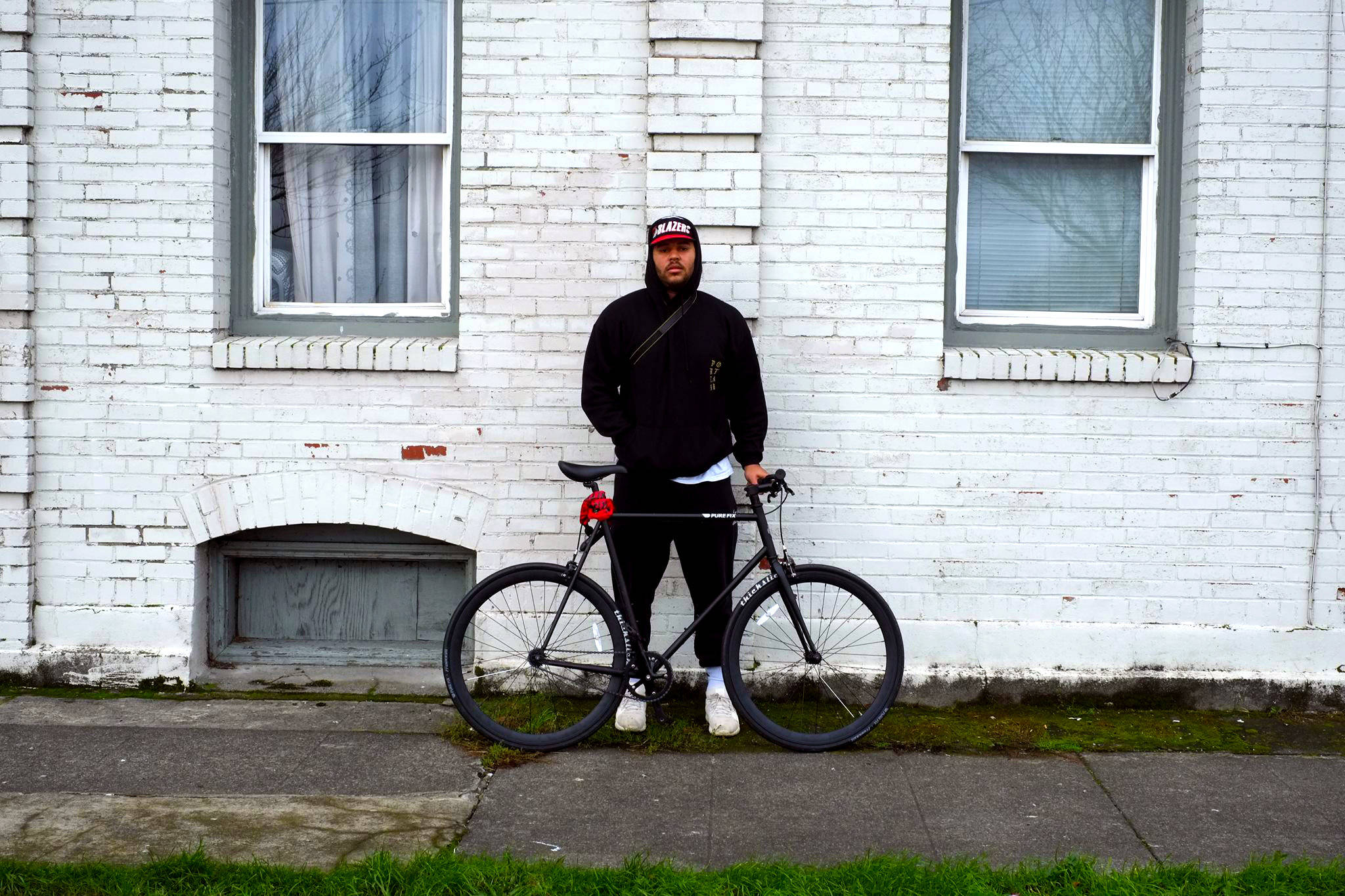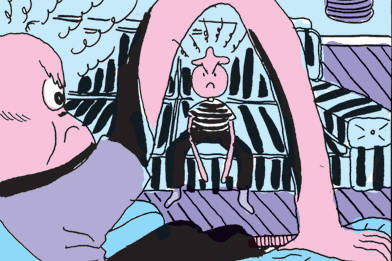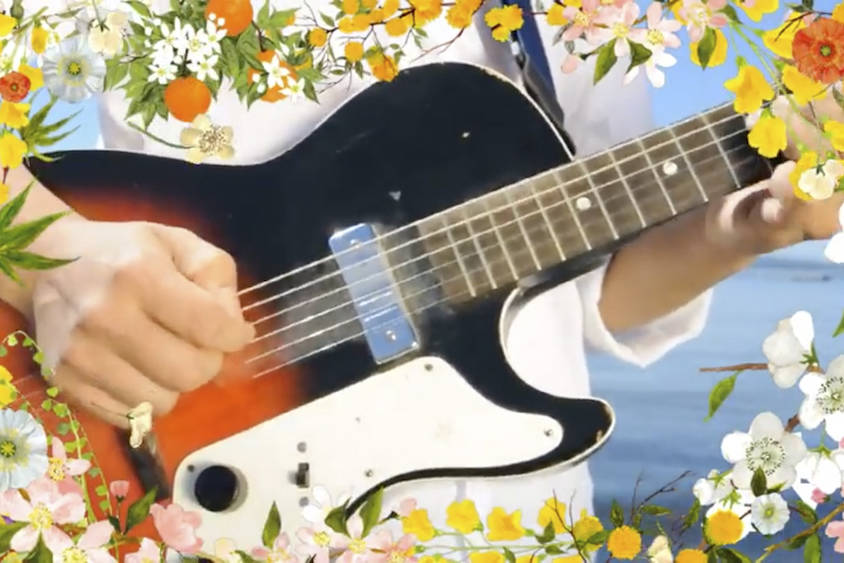June was ostensibly the beginning of summer, but as usual it was top-loaded with blah gray days that have given way to brilliant sunny ones. Fittingly, the best local music that emerged this Junuary all mixed some of that transcendent, glimmering light with an equal dose of lingering, overcast introspection. Should I be wearing pants or shorts today? Should I be crying during these records, or rejoicing? Like a pair of zip-off cargo shorts, these records had it both ways—but unlike cargo shorts, the result is actually cool.
Trowa Barton
SURVIVING NOT LIVING
Everything Trowa Barton touches has a religious aura. Stick some sub-bass and trap snares in a cathedral, hit record, and rhyme about personal demons. The music is beautiful the way saints in stained glass windows are: ornate, elegant, but more than a little unsettling—peering out with eyes that at once offer salvation and condemn mortal sin. “Now I gotta pray, pray for the people,” Trowa intones over icy, water-warped harps on “Clickin,” the fourth track off the Seattle rapper’s new album, SURVIVING NOT LIVING. As metaphysical as his production may be—full of echoing, eerie melodies, Björk samples, and twilit percussion—the subject matter in his verses are a grounded assessment of our moment, as seen through the eyes of a young man doing just what the record title says.
“Blocking out the white noise/Nationalists, the white boys/Socialism, Marx now/Specialist at heart now,” he raps on “Route 101,” a song that turns bus- and bike-bound observations of a racially fraught, economically trying Seattle into a manifesto of collective preservation. “I be in my own space/Tryin’ make my own place/Tryin’ keep my own safe/New city killing us.”
It’s a bracing song, one that woke me up at first listen. “Between health insurance and my loans … I’m living check to check to live in Seattle [with] an entry level job after graduating college,” Barton writes me when I ask about the circumstance that inspired the song. “I always considered myself a socialist since I found out what it meant. Watching what our government is doing to us is pure evil—the rhetoric I hear from these politicians, that we’re lazy, entitled etc., ‘Pull yourself up.’ I played by the rules but the rules aren’t made for me or the majority of people to succeed.”
That there are exalting, angelic choirs during Trowa’s lament on “Mannequin” makes his message stand out in stark relief—“I can’t keep pretending that I’m happy/I’m not/I keep feeling like I’m gonna die/A lot … Give me death or give me love.” It’s a simple refrain, one lots of people can probably feel right now. But spoken out loud so plainly and with such heavenly noise behind it, it sounds less like a confession and more like a call to revolution. It’s a feeling Barton invoked on his gauzy 2016 record Post-Romanticism, one of my favorites of the year—but on SURVIVING NOT LIVING, his baroque call to arms feels less like a romantic vision than a dire reality. soundcloud.com/trowabarton
Lushloss
Asking/Bearing
Everyone from Drake to Frank Ocean to Porter Ray is putting voice mails and recorded phone conversations in their music. Is there any other way to make a song feel instantly more personal than splicing in your own private messages and exchanges? The trick is typically employed as an outro or interlude, but on Asking/Bearing, the new album from Seattle songwriter Lushloss, a recorded Skype conversation between the electronic musician (Olive Jun) and her mother forms the spine of the album’s entire A-side. “Oh my gosh, sorry, that’s so weird. I haven’t heard my old name in a while, sorry,” Jun, who is trans, tells her Korean mother nervously at the end of the record’s first track, “St. Marco.” “Can I ask you something?” she continues. “When did your dad die?” The next song begins before her mother can answer, but we hear her story by the time it’s done.
Asking, the record’s first half, is named for the intense, revealing questions Jun, who recently relocated here from Virginia, poses to her mother in the side-spanning conversation. They’re questions about trauma, emotional health, ailing relatives, and those already gone, clips of which bookend its seven tracks. Between these clips, Jun writes lace-like, plaintive elegies that evoke the fluttering, electronic experimentalism of artists like Múm and James Blake with the confessional weight of Elliott Smith. Unlike in Smith’s work, that weight comes less from the words she’s singing than from the creative ways she composes her own voice—affected with Auto-Tune, blown out with sputtering lo-fi saturation, or pitched up to delicate helium-like heights. In effect, Asking acts almost like a sound-play, a glimpse into the lives of the generations that brought Jun here, funneled through her mother, molded into song.
For all of Asking’s creative personal framing and sonic experimentation, Bearing, the record’s second seven-track half, is where the album truly shines. Here, Jun switches into full-on production mode, showcasing her inventive approach to beat-making. The ephemeral, organic tonalities that waft through the record’s first half remain, but they crackle even more vividly with the addition of percussion. On “Hold uu,” time-warped melodies glitch out on top of drums that clatter like the ticking of clocks. “Gymnasium,” an introspective dance song, sounds as though it was recorded in reverse, dusting the entire track with a comforting, otherworldly warble. The attention to craft is obvious in the intricate webs the artist weaves from these delicate sounds, an exciting addition to local label Hush Hush record’s genre-bending cast of producers. Out now on cassette, available digitally July 28. hushhushrecords.bandcamp.com
Shit Ghost
1: The Creation
I admit I clicked on this album because of the artist’s name. I wasn’t disappointed. This Seattle performer, who plays wearing a plain white morph suit and swirly hypno-glasses, writes a bizarre kind of post-rock dubbed “underwater psychedelic” that, refreshingly, takes itself far, far less seriously than its apocalypse-obsessed contemporaries do. Take “The Meeting of James Franco,” a nearly nine-minute epic full of swelling, glacial guitar sweeps, cavernous drumming, emotional builds, and … some operatic, cartoonish mumble-yelps filtered through extreme tremolo. Then, almost by song’s end, we’ve arrived at some sort of trans-dimensional alien disco. The songs often shift from Godspeed!-like grandeur into goofy, noodly soft funk and screeching, wah’d-out guitar leads. Transfixing, weird, and a guaranteed fun live show. Shitghost.bandcamp.com
ksears@seattleweekly.com








